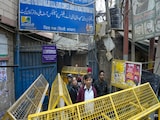China's top Covid official and multiple cities have signalled a possible relaxing of the country's strict zero-tolerance approach to the virus, after nationwide protests calling for an end to lockdowns and greater political freedom.
Anger over China's zero-Covid policy -- which involves mass lockdowns, constant testing and quarantines even for people who are not infected -- has sparked protests in major cities, including Beijing, Shanghai and Guangzhou.
But while authorities have called for a "crackdown" in the wake of the demonstrations, they have also begun hinting that a relaxation of the hardline virus strategy could be in the works.
Speaking at the National Health Commission Wednesday, Vice Premier Sun Chunlan said the Omicron variant was weakening and vaccination rates were improving, according to the state-run Xinhua news agency.
Sun -- a central figure behind Beijing's pandemic response -- said this "new situation" required "new tasks".
She made no mention of the zero-Covid policy in her latest remarks, suggesting an approach that has disrupted the economy and daily life might soon be relaxed.
The comments came as the Chinese capital said it would scale back daily testing requirements -- a tedious mainstay of life under zero-Covid.
The elderly, those who work from home, students and teachers in online education and others who do not leave home frequently are now exempt from daily tests, Xu Hejian, a spokesman for the Beijing Municipal Government, said Wednesday.
Beijing residents still require a negative Covid test taken within 48 hours to enter public places such as cafes, restaurants and shopping malls, however.
And a report by the state-owned Southern Metropolis Daily Thursday said that local officials in Beijing and Guangzhou were planning to allow some positive Covid cases to quarantine at home instead of at state-run facilities.
The report was later deleted, and AFP requests for confirmation from local authorities in those cities went unanswered.
- 'Living with Covid' -
Southern manufacturing hub Guangzhou -- the site of dramatic Tuesday night clashes between police and protesters -- also announced an end to daily mass testing for those who do not need to leave home frequently, including the elderly and infants.
On Thursday, Haizhu district, where recent protests took place, went a step further, saying only those in certain sectors including medical staff, pharmacists, sanitary and delivery workers require daily tests.
Officials the previous day also partially lifted a weeks-long lockdown, despite seeing record virus cases, easing restrictions to varying degrees in all of its 11 districts, including Haizhu.
The central city of Chongqing also said Wednesday that close contacts of Covid cases who met certain conditions would be allowed to quarantine at home -- a departure from rules that required them to be sent to central isolation facilities.
Sun's remarks -- as well as relaxations of rules by local authorities -- "could signal that China is beginning to consider the end of its stringent zero-Covid policy," ANZ Research analysts said.
"We believe that Chinese authorities are shifting to a 'living with Covid' stance, as reflected in new rules that allow people to do 'home isolation' instead of being ferried away to quarantine facilities."
The country reported 35,800 domestic covid cases on Thursday, most of them asymptomatic.
- 'Sign of weakness' -
As China reaches the third anniversary of the pandemic first being detected in the central city of Wuhan, its hardline approach to the virus has stoked unrest not seen since the 1989 pro-democracy protests.
A deadly fire last week in Urumqi, the capital of the northwestern region of Xinjiang, was the catalyst for the outrage, with people blaming Covid curbs for trapping victims inside the burning building.
But demonstrators have also demanded wider political reforms, with some even calling for President Xi Jinping to stand down.
China's strict control of information and continued travel curbs have made verifying protester numbers across the vast country very challenging.
However, the widespread rallies seen over the weekend are exceptionally rare in China.
The 1989 pro-democracy protests ended in bloodshed when the military moved in, most famously in Beijing's Tiananmen Square and surrounding areas.
The death on Wednesday of former Chinese leader Jiang Zemin -- who came to power just after Tiananmen and played a key role in the suppression of the demonstrations -- spurred comparisons between the two protest movements.
Wang Dan, who was jailed and then exiled after the Tiananmen pro-democracy movement was crushed, told reporters in Japan on Thursday that China's recent string of protests proved that younger Chinese are not politically apathetic.
"The first feeling that came to my mind when I witnessed the incredible protests across China was the spirit of 1989 has come again, after 33 years," Wang said speaking in Tokyo.
"So this is a big significance of this movement, it reveals the truth. The truth is that it's not a harmonious society... there's already a lot of conflict between society and the government."
(This story has not been edited by NDTV staff and is auto-generated from a syndicated feed.)















